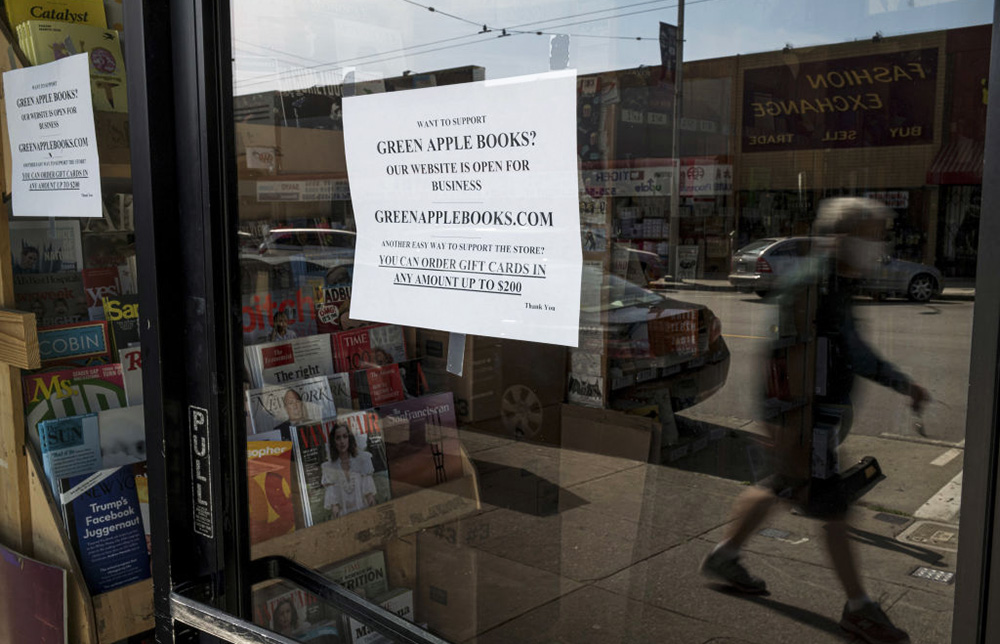美国邮政总局(United States Postal Service,USPS)是少数几个总能获得民主党和共和党两党支持的政府部门之一。这是因为邮政总局是一个独立的行政部门,它所提供的服务会影响到每一个美国人、每一栋住宅和每一家企业。在邮政总局遭遇危机期间,独立书店成为高风险行业之一。
多年来,独立书店一直处在岌岌可危的状态,面临着新兴的大型书店的竞争(并且通常处在下风),但这些大型书店在亚马逊(Amazon)横空出世之后都已经消失不见。然而在地方社区的支持下,许多独立书店坚持了下来,并且出现了一些服务边缘和弱势社区的独立书店。事实上,据Statista统计,过去几年美国的独立书店数量呈增长趋势,截至2019年年底,共有1,887家独立书商经营着2,524家书店。
后来发生了新冠疫情,随之而来的停工对绝大多数零售企业造成了毁灭性打击。虽然美国部分书店已经复工,甚至某些地区的书店一次允许多位顾客进入,但很多书店严重依赖通过路边自提和邮寄方式履行的在线订单。但特朗普支持的邮政总局局长路易斯•德乔伊在7月24日公布一项计划,即减慢邮寄速度以节约成本(没有透露具体能节约多少成本)。无论是即将开始的大选,还是在疫情期间经营已经举步维艰的企业的生存,都会因为该计划遭遇灾难性的打击。

Reparations Club的创始人杰兹•麦克吉尔伯特说:“我们依靠邮政服务满足新老客户的需求,这既是优势也是挑战。”Reparations Club是位于洛杉矶的一家书店,也是一家概念店和社区空间。
在疫情爆发之前,Reparations Club主打实体零售体验。麦克吉尔伯特解释说:“在疫情之前,我们致力于与洛杉矶市中心和南部的本地社区建立关系。我们主要依靠顾客的口口相传。我们没有网店,因此邮寄订单很少。”
但在疫情爆发之后的几个月里,洛杉矶成为疫情中心,许多商户依旧关闭,实体店一直停业,因此Reparations Club从2019年开业以来首次转向了在线业务。麦克吉尔伯特说,新冠疫情和今年夏天支持“珍视黑人生命”的抗议示威活动,彻底颠覆了该书店的业务;现在书店99%的订单通过USPS邮寄。麦克吉尔伯特表示,书店每天都会给顾客寄书,有时候会派专人配送本地订单,甚至会邀请常客直接到她家中取书。
但7月底执行的邮政服务改革很快让书商遭遇重创。麦克吉尔伯特说,她的书店遭遇了多次包裹配送延误和丢失,结果造成了严重的客户服务问题。麦克吉尔伯特充分利用当前的情况,与本地邮局的员工交朋友,并根据他们的建议进行调整。

她说:“我们调整了工作流程和预期。尽管如此,我们还是明显感觉到,许多新客户首次从黑人所有的书店买书。对我们来说,给客户留下最好的第一印象始终非常重要,但由于快递延误,我们很难做到这一点。很可惜,黑人的公司要承担很多不合理的负担。但总体上过来说,我们的客户都很理智,他们清楚我们不是亚马逊这样的公司,他们知道会发生什么。客户非常理解我们为什么选择继续通过USPS寄书,而不使用私营快递公司。”
媒体邮件邮递
书店使用USPS的另外一个好处是,书店还可以选择一类特殊的邮件进行邮寄,这对于书商和顾客而言都很划算。媒体邮件的基础运费为2.80美元,用于邮寄图书、出版的音乐资料、手稿、DVD、CD等媒体和教育资料非常划算。
旧金山青苹果书店(Green Apple Books)的老板之一彼得•马尔维希尔说:“USPS对书店的运营至关重要,无论是从供应商采购图书,还是以优惠的价格向全国各地的顾客邮寄图书,都离不开USPS。甚至有些地方只能接收USPS邮件,比如监狱等。”
马尔维希尔是美国书商协会(American Booksellers Association)的委员会成员。他说从3月16日有知名独立书店关闭以来,整个行业的形势如同坐过山车一般。几个月来,所有图书销售业务都转到了线上。但马尔维希尔说,在3月和4月,青苹果书店得到了源源不断的支持,而且书店几乎只通过USPS的媒体邮件(有时采用优先邮件)履行订单。马尔维希尔表示:“有些本地订单我们会亲自配送,但看着一个包裹被送到几英里外的城市另一端,转到洛杉矶几天之后再送回到本地,这让人很难接受。但我们的顾客很有耐心。”
5月中旬,青苹果书店复工,开始提供路边自提业务,但公司大部分销售都是来自在线订单或手机订单,依旧需要邮寄,并且几乎全部订单都通过USPS媒体邮件发出。青苹果书店每天营业11个小时,并且已经允许顾客在书店看书,但书店仍然有约20%的销售额来自线上订单(疫情之前只有1%)。马尔维希尔说:“我们与亚马逊不同。我们无法在连续几十年亏损的同时扩大市场份额。我们也养不起自己的飞机、卡车和承包商,所以USPS非常重要。”
他解释说:“在3月和4月,整个USPS系统的邮寄速度明显放缓,原因是显而易见的。通过这些原因,我们应该明白USPS对于生活必需品邮寄的重要性。后来情况有所好转,但如今邮寄速度再次变慢。即便是优先邮件有时候也需要一周的时间才能送达。以往优先邮件只需要两三天时间就可以准时送达任何地方。这让我们的客户非常不满,增加了员工的工作量,而且这无疑会让我们损失许多订单。因为人们更愿意从只要两天就能送达的亚马逊上购物,不想等上一周来支持我们。”

杰夫•梅耶森与妻子琳达•西蒙森在马萨诸塞州剑桥共同经营一家哈佛书店(Harvard Book Store)。该书店通过USPS履行的订单在其业务中所占的比例,已经超过了疫情之前。最近,该书店主要依靠线上销售和大量采购业务才得以维持经营。
梅耶森说:“如果顾客不相信我们能准时送达图书,我们担心他们会选择其他途径买书。书店的总体业务量大幅减少,这让我们难以承受更多收入损失。”
自疫情爆发以来,书店的业务量明显下滑。在4月和5月,书店唯一的收入来自其通过与本地书商网站整合的第三方服务Bookshop.org履行的订单。6月初,哈佛书店开始履行自己的网络订单。约一半网络订单通过USPS完成,另外一半采取了路边自提的方式。积极的一面是,过去几个月,哈佛书店的网上销售额增长了500%至700%。7月,哈佛书店重新对顾客开放,但限制了人数,并缩短了营业时间。
梅耶森解释说:“雪上加霜的是,我们使用USPS的媒体邮件服务作为一种划算的图书邮寄方式。媒体邮件的优先级低于普通邮件或优先邮件。因此,我们预测整个邮政服务系统中断将对媒体邮件服务产生特别严重的影响。如果我们不得不选择一种替代USPS媒体邮件的服务,我们的邮寄成本会飙升到客户难以接受的程度。因此,邮政服务中断会减少我们的收入,同时增加成本,这两方面的影响会给我们带来灾难性的后果。”

但在8月19日星期二,形势急转直下。邮政总局局长德乔伊改变了态度,宣布暂停削减邮政服务,直到11月3日美国总统大选结束为止,他宣称此举的目的是防止影响邮寄选票。但他没有具体说明是否要推翻已经执行的对邮政服务的改革措施,包括拆除各地的邮件分拣机和邮箱等。这些改革措施依旧会阻碍邮寄速度,包括媒体邮件的邮寄,因为许多图书和光盘类包裹通常很薄,很容易塞到邮箱里,而且可以在家或在公司打印邮票。
马尔维希尔说:“如果说[本周]有哪些令人安心的好消息,那就是特朗普政府破坏USPS系统的计划已经失败。但USPS仍然需要支持,尤其是邮寄选票作为一种重要的选举方式,将有大量选票要通过USPS邮寄。”
梅耶森认为,现在判断USPS危机对其书店业务的影响仍然为时尚早。他解释说:“我们一直觉得USPS的服务非常可靠,所以我们以前不需要跟踪邮寄速度。这导致我们没有进行比较的可靠基础。我们开始听说邮件延误的报告,但这些信息现在还只是道听途说而已。我们将开始跟踪邮件送达时间,监控具体情况。出于上文所述的原因,我们认为如果邮政服务中断,将威胁书店的生存。”(财富中文网)
译者:Biz
美国邮政总局(United States Postal Service,USPS)是少数几个总能获得民主党和共和党两党支持的政府部门之一。这是因为邮政总局是一个独立的行政部门,它所提供的服务会影响到每一个美国人、每一栋住宅和每一家企业。在邮政总局遭遇危机期间,独立书店成为高风险行业之一。
多年来,独立书店一直处在岌岌可危的状态,面临着新兴的大型书店的竞争(并且通常处在下风),但这些大型书店在亚马逊(Amazon)横空出世之后都已经消失不见。然而在地方社区的支持下,许多独立书店坚持了下来,并且出现了一些服务边缘和弱势社区的独立书店。事实上,据Statista统计,过去几年美国的独立书店数量呈增长趋势,截至2019年年底,共有1,887家独立书商经营着2,524家书店。
后来发生了新冠疫情,随之而来的停工对绝大多数零售企业造成了毁灭性打击。虽然美国部分书店已经复工,甚至某些地区的书店一次允许多位顾客进入,但很多书店严重依赖通过路边自提和邮寄方式履行的在线订单。但特朗普支持的邮政总局局长路易斯•德乔伊在7月24日公布一项计划,即减慢邮寄速度以节约成本(没有透露具体能节约多少成本)。无论是即将开始的大选,还是在疫情期间经营已经举步维艰的企业的生存,都会因为该计划遭遇灾难性的打击。
Reparations Club的创始人杰兹•麦克吉尔伯特说:“我们依靠邮政服务满足新老客户的需求,这既是优势也是挑战。”Reparations Club是位于洛杉矶的一家书店,也是一家概念店和社区空间。
在疫情爆发之前,Reparations Club主打实体零售体验。麦克吉尔伯特解释说:“在疫情之前,我们致力于与洛杉矶市中心和南部的本地社区建立关系。我们主要依靠顾客的口口相传。我们没有网店,因此邮寄订单很少。”
但在疫情爆发之后的几个月里,洛杉矶成为疫情中心,许多商户依旧关闭,实体店一直停业,因此Reparations Club从2019年开业以来首次转向了在线业务。麦克吉尔伯特说,新冠疫情和今年夏天支持“珍视黑人生命”的抗议示威活动,彻底颠覆了该书店的业务;现在书店99%的订单通过USPS邮寄。麦克吉尔伯特表示,书店每天都会给顾客寄书,有时候会派专人配送本地订单,甚至会邀请常客直接到她家中取书。
但7月底执行的邮政服务改革很快让书商遭遇重创。麦克吉尔伯特说,她的书店遭遇了多次包裹配送延误和丢失,结果造成了严重的客户服务问题。麦克吉尔伯特充分利用当前的情况,与本地邮局的员工交朋友,并根据他们的建议进行调整。
她说:“我们调整了工作流程和预期。尽管如此,我们还是明显感觉到,许多新客户首次从黑人所有的书店买书。对我们来说,给客户留下最好的第一印象始终非常重要,但由于快递延误,我们很难做到这一点。很可惜,黑人的公司要承担很多不合理的负担。但总体上过来说,我们的客户都很理智,他们清楚我们不是亚马逊这样的公司,他们知道会发生什么。客户非常理解我们为什么选择继续通过USPS寄书,而不使用私营快递公司。”
媒体邮件邮递
书店使用USPS的另外一个好处是,书店还可以选择一类特殊的邮件进行邮寄,这对于书商和顾客而言都很划算。媒体邮件的基础运费为2.80美元,用于邮寄图书、出版的音乐资料、手稿、DVD、CD等媒体和教育资料非常划算。
旧金山青苹果书店(Green Apple Books)的老板之一彼得•马尔维希尔说:“USPS对书店的运营至关重要,无论是从供应商采购图书,还是以优惠的价格向全国各地的顾客邮寄图书,都离不开USPS。甚至有些地方只能接收USPS邮件,比如监狱等。”
马尔维希尔是美国书商协会(American Booksellers Association)的委员会成员。他说从3月16日有知名独立书店关闭以来,整个行业的形势如同坐过山车一般。几个月来,所有图书销售业务都转到了线上。但马尔维希尔说,在3月和4月,青苹果书店得到了源源不断的支持,而且书店几乎只通过USPS的媒体邮件(有时采用优先邮件)履行订单。马尔维希尔表示:“有些本地订单我们会亲自配送,但看着一个包裹被送到几英里外的城市另一端,转到洛杉矶几天之后再送回到本地,这让人很难接受。但我们的顾客很有耐心。”
5月中旬,青苹果书店复工,开始提供路边自提业务,但公司大部分销售都是来自在线订单或手机订单,依旧需要邮寄,并且几乎全部订单都通过USPS媒体邮件发出。青苹果书店每天营业11个小时,并且已经允许顾客在书店看书,但书店仍然有约20%的销售额来自线上订单(疫情之前只有1%)。马尔维希尔说:“我们与亚马逊不同。我们无法在连续几十年亏损的同时扩大市场份额。我们也养不起自己的飞机、卡车和承包商,所以USPS非常重要。”
他解释说:“在3月和4月,整个USPS系统的邮寄速度明显放缓,原因是显而易见的。通过这些原因,我们应该明白USPS对于生活必需品邮寄的重要性。后来情况有所好转,但如今邮寄速度再次变慢。即便是优先邮件有时候也需要一周的时间才能送达。以往优先邮件只需要两三天时间就可以准时送达任何地方。这让我们的客户非常不满,增加了员工的工作量,而且这无疑会让我们损失许多订单。因为人们更愿意从只要两天就能送达的亚马逊上购物,不想等上一周来支持我们。”
杰夫•梅耶森与妻子琳达•西蒙森在马萨诸塞州剑桥共同经营一家哈佛书店(Harvard Book Store)。该书店通过USPS履行的订单在其业务中所占的比例,已经超过了疫情之前。最近,该书店主要依靠线上销售和大量采购业务才得以维持经营。
梅耶森说:“如果顾客不相信我们能准时送达图书,我们担心他们会选择其他途径买书。书店的总体业务量大幅减少,这让我们难以承受更多收入损失。”
自疫情爆发以来,书店的业务量明显下滑。在4月和5月,书店唯一的收入来自其通过与本地书商网站整合的第三方服务Bookshop.org履行的订单。6月初,哈佛书店开始履行自己的网络订单。约一半网络订单通过USPS完成,另外一半采取了路边自提的方式。积极的一面是,过去几个月,哈佛书店的网上销售额增长了500%至700%。7月,哈佛书店重新对顾客开放,但限制了人数,并缩短了营业时间。
梅耶森解释说:“雪上加霜的是,我们使用USPS的媒体邮件服务作为一种划算的图书邮寄方式。媒体邮件的优先级低于普通邮件或优先邮件。因此,我们预测整个邮政服务系统中断将对媒体邮件服务产生特别严重的影响。如果我们不得不选择一种替代USPS媒体邮件的服务,我们的邮寄成本会飙升到客户难以接受的程度。因此,邮政服务中断会减少我们的收入,同时增加成本,这两方面的影响会给我们带来灾难性的后果。”
但在8月19日星期二,形势急转直下。邮政总局局长德乔伊改变了态度,宣布暂停削减邮政服务,直到11月3日美国总统大选结束为止,他宣称此举的目的是防止影响邮寄选票。但他没有具体说明是否要推翻已经执行的对邮政服务的改革措施,包括拆除各地的邮件分拣机和邮箱等。这些改革措施依旧会阻碍邮寄速度,包括媒体邮件的邮寄,因为许多图书和光盘类包裹通常很薄,很容易塞到邮箱里,而且可以在家或在公司打印邮票。
马尔维希尔说:“如果说[本周]有哪些令人安心的好消息,那就是特朗普政府破坏USPS系统的计划已经失败。但USPS仍然需要支持,尤其是邮寄选票作为一种重要的选举方式,将有大量选票要通过USPS邮寄。”
梅耶森认为,现在判断USPS危机对其书店业务的影响仍然为时尚早。他解释说:“我们一直觉得USPS的服务非常可靠,所以我们以前不需要跟踪邮寄速度。这导致我们没有进行比较的可靠基础。我们开始听说邮件延误的报告,但这些信息现在还只是道听途说而已。我们将开始跟踪邮件送达时间,监控具体情况。出于上文所述的原因,我们认为如果邮政服务中断,将威胁书店的生存。”(财富中文网)
译者:Biz
The United States Postal Service is one of the few agencies that almost always receives bipartisan support among Democrats and Republicans. That’s because the independent agency of the executive branch is a service that touches every person in the country, every residence, and every business. And among the businesses at risk during the crisis happening at the USPS are independent bookstores.
Indie bookstores had already been hanging on by a thread for years, facing off (and often losing) against the emergence of big-box bookstores, which in turn have all but perished in the wake of Amazon. Nevertheless, with the support of local communities, many indie bookstores have held on, and others have emerged to cater to marginalized and underserved communities. The number of independent bookstores in the U.S. had actually been on the rise in the past few years, with 1,887 independent bookselling companies running 2,524 stores by the end of 2019, according to Statista.
Then came the COVID-19 pandemic, and the ensuing economic shutdowns have been nothing but devastating for the vast majority of retailers. Although some bookstores around the country have been able to reopen, even to the point of allowing a few customers inside at a time in select areas, many of them are relying heavily on online requests with curbside pickup and delivery by mail to fulfill orders. But when Trump-backed postmaster general Louis DeJoy announced plans on July 24 that would slow mail delivery but save costs (without any further specifics as to how much), catastrophe loomed on all fronts, from the upcoming election to the survival of businesses already struggling to stay open through the pandemic.
“We’re leaning on the Postal Service pretty hard to reach our old and new customers, and it’s been both a blessing and a challenge,” says Jazzi McGilbert, founder of Reparations Club, a bookstore, community space, and concept shop in Los Angeles.
Pre-pandemic, Reparations Club was very much a physical retail experience. “Before the pandemic, we were focused on building relationships with our local community here in Mid-City and South L.A.,” McGilbert explains. “Things were so word-of-mouth—we hadn’t launched an online shop—that shipping requests were rare.”
But in the months since, as Los Angeles has become a hotspot for the virus, and many businesses remain shuttered, the brick-and-mortar shop has been closed, and Reparations Club transitioned its business online for the first time since opening in 2019. The simultaneous events of the pandemic and the social demonstrations supporting Black Lives Matter this summer completely shifted the business, McGilbert says; now 99% of the store’s orders are delivered via USPS. The bookstore is shipping books daily, sometimes hand-delivering locally, and even inviting some regular customers to pick up books from her home directly, McGilbert notes.
But the Postal Service changes implemented at the end of July hit booksellers hard and fast. McGilbert says her store experienced many delays and lost packages, which in turn led to major customer service headaches. McGilbert made the best of the situation, making friends with the crew at her local post office and making adjustments according to their advice.
“We’ve adjusted our workflow and expectations. That said, we’re hyperaware that many of our new customers are buying from Black-owned bookstores for the very first time. It’s important to us that we put our best foot forward always, and that’s been hard to reconcile with the shipping delays. Unfortunately, Black businesses carry a lot of undue burdens,” McGilbert says. “But by and large, our customers are pretty conscious shoppers—they know we’re not Amazon, and they know what’s up. Those customers have been overwhelmingly understanding of our explanations why we’ll continue to ship via USPS over private carriers.”
Media Mail delivery
Bookstores also benefit thanks to a special classification of mail that is more cost-effective for both booksellers and customers. With pricing starting at $2.80, Media Mail is a cost-effective way to send media and educational materials, such as books, printed music, manuscripts, DVDs, CDs, and more.
“The USPS is vital to our operations, from receiving books from our suppliers to being able to affordably mail orders to customers all over the country. There are even places, like prisons, that can only receive books via USPS,” says Pete Mulvihill, co-owner of San Francisco’s Green Apple Books.
Mulvihill, also a board member of the American Booksellers Association, says it’s been a roller coaster since the famous indie bookstore first closed on March 16. All sales moved online for several months. But Mulvihill says Green Apple saw a huge outpouring of support in March and April, and the store fulfilled orders almost exclusively via USPS Media Mail (and sometimes Priority Mail). "We did a little bit of local delivery ourselves, but it was hard to watch a package going a few miles across town go to Los Angeles for a few days before coming back. But our customers were patient," Mulvihill says.
In mid-May, Green Apple Books reopened for curbside pickup, but a majority of the company's sales were still mailed out, either from online or phone orders, almost all via USPS Media Mail. Even with browsing available and doors open 11 hours each day, approximately 20% of its sales are online (up from 1% pre-COVID). “Unlike Amazon, we can’t lose money for decades while growing market share, nor can we afford our own fleet of planes and vans and contractors, so USPS is crucial,” Mulvihill says.
“Shipments slowed down quite a bit throughout the USPS system in March and April for obvious reasons. Those obvious reasons should illustrate how important USPS’s role is in delivering essential goods. Things got better for a bit, then slowed again recently,” Mulvihill explains. “Even Priority Mail—which used to reliably get anywhere within two to three days—was sometimes taking a week. That frustrated our customers, led to more staff work, and doubtlessly cost us orders from folks who would rather get something from Amazon in two days than wait a week to support us.”
Orders fulfilled via USPS constitute a much larger percentage of the business than was the case prior to the pandemic for Jeff Mayersohn, who co-owns the Harvard Book Store in Cambridge, Mass., with his wife, Linda Seamonson. Lately their business has survived primarily on web-based sales and bulk purchases.
“If customers cannot count on us to deliver books in a timely fashion, we fear that they will seek alternatives,” says Mayersohn. “Since total business is down significantly, we cannot afford to lose additional revenue.”
Since the pandemic started, business has been down significantly. In April and May, the only revenue coming in was through Bookshop.org, a third-party service integrated with local bookseller websites for order fulfillments. In early June, the Harvard Book Store was able to start fulfilling its own web orders. Approximately half of the web-based orders are fulfilled through USPS and half via curbside pickup. On the positive side, web sales for the Harvard Book Store have been up between 500% and 700% over the past few months. In July, the Harvard Book Store reopened to walk-in customers with a limited capacity and reduced hours.
“Compounding the problem is that we use USPS’s Media Mail service as a cost-effective method for shipping books. Media Mail receives lower priority handling than First-Class or Priority Mail. We, therefore, would expect Media Mail to be disproportionately affected by disruptions in overall mail service,” Mayersohn explains. “If we had to seek an alternative to USPS Media Mail, our shipping costs would balloon to unacceptable levels. Thus, any disruptions to mail service would have the combined affect of reducing revenue and increasing costs, the combination of which would be catastrophic.”
But on Tuesday, Aug. 19 came a sudden reversal, with DeJoy doubling back and suspending the cutbacks to the Postal Service until after the presidential election on Nov. 3 with the expressed intent to avoid the appearance of any impact on election mail. But it was not specified as to whether or not the postmaster general would roll back any of the changes already made to the Postal Service, including the removal of many sorting machines and mailboxes around the country. Those changes still stand to slow down the mail, including the delivery of Media Mail, as many packages of books and disc-based content are typically slim enough to be slipped into mailboxes quite easily with postage printed at home or at work.
“If [this week’s] news is any reassurance, perhaps the Trump administration’s apparent efforts to cripple the USPS have failed. But it still needs support, especially as a crucial election approaches with lots of ballots flowing through USPS,” Mulvihill says.
Mayersohn suggests it might be too soon to judge the effect of the USPS crisis on his own business. “The USPS has been such a reliable service for us that we’ve never had to track speed of delivery in the past,” he explains. “As a result, we don’t have a reliable basis for comparison. We are beginning to hear reports of delays, but this information is anecdotal right now. We will begin to track delivery times to monitor the situation. For the reasons stated above, we view the possibility of disruptions in mail service as an existential threat.”






